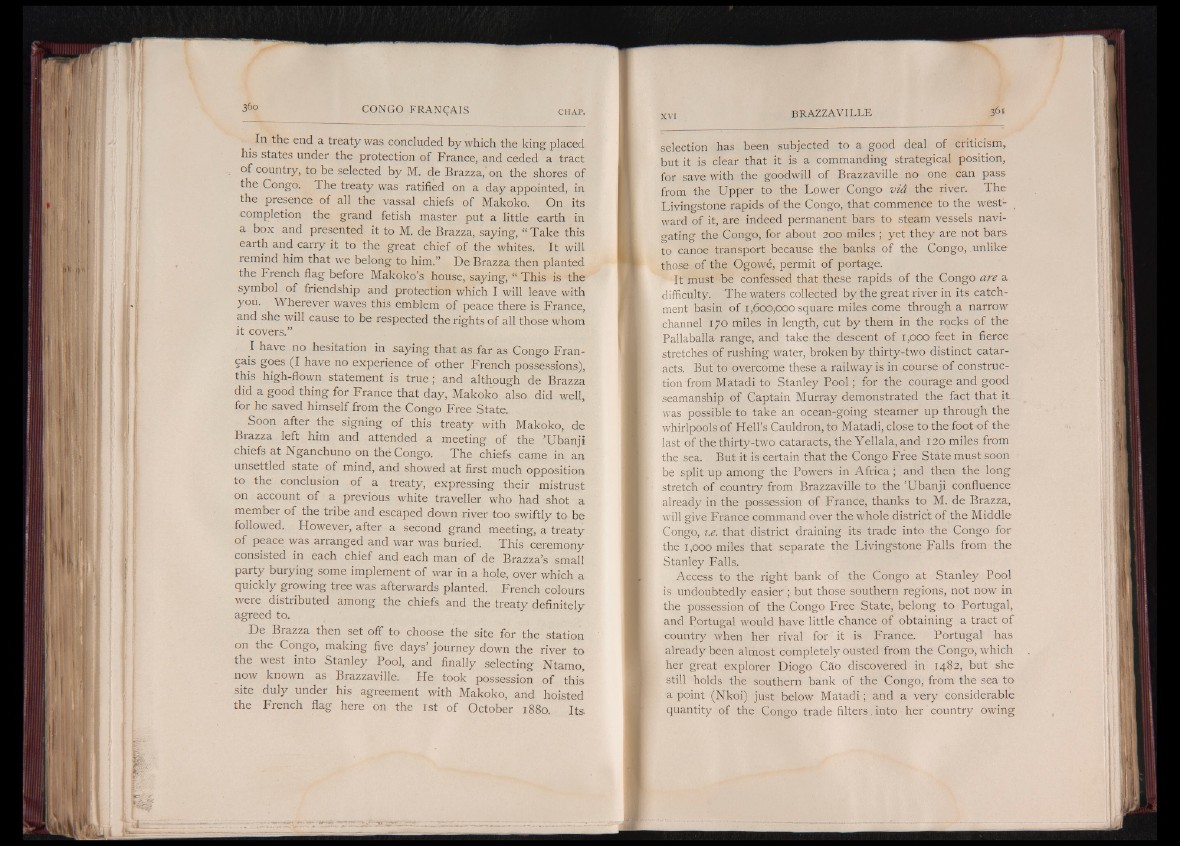
n In the end a treaty was concluded by which the king placed
his states under the protection of France, and ceded a tract
. of country, to be selected by M. de Brazza,'on the shores of
the Congo. The treaty was ratified on a day appointed, in
the presence of all the vassal chiefs of Makoko. On its
completion the grand fetish master put a little earth in
a box and presented it to M. de Brazza, saying, « Take this
earth and carry it to the great chief of the whites. It will
remind him that we belong to him.” De Brazza then planted
the French flag before Makoko’s house, saying, “ This is the
symbol of friendship and protection which I will leave with
you. Wherever waves this emblem of peace there is France,
and she will cause to be respected the rights of all those whom
it covers.”
I have no hesitation in saying that as far as Congo Fran-
çais goes (I have no experience of other French possessions),
this high-flown statement is true ; and although de Brazza
did a good thing for France that day, Makoko also did well,
for he saved himself from the Congo Free State.
Soon after the signing of this treaty with Makoko, de
Brazza left him and attended a meeting of the ’Ubanji
chiefs at Nganchuno on thé Congo. The chiefs came in an
unsettled state of mind, and showed at first much opposition
to the conclusion of a treaty, expressing their mistrust
on account of a previous white traveller who had shot a
member of the tribe and escaped down river too swiftly to be
followed. However, after a second grand meeting, a treaty
of peace was arranged and war was buried. This ceremony
consisted in each chief and each man of de Brazza’s small
party burying some implement of war in a hole, over which a
quickly growing tree was afterwards planted. French colours
were distributed among the chiefs and the treaty definitely
agreed to.
De Brazza then set off to choose the site for the station
on the Congo, making five days’ journey down the river to
the west into Stanley Pool, and finally selfecting Ntamo,,
now known as Brazzaville. He took possession of this*
site duly under his agreement with Makoko, and hoisted
the French flag here on the ist of October 1880. Its
selection has been subjected to a good deal of criticism,
but it is clear that it is a commanding strategical position,
for save with the goodwill of Brazzaville no one can pass
from the Upper to the Lower Congo viA the river. The
Livingstone rapids of the Congo, that commence to the west- i
ward of it, are indeed permanent bars to steam vessels navigating
the Congo, for about 200 miles ; yet they are not bars
to canoe transport because the banks of the Congo, unlike
those of the Ogow6, permit of portage.
It must be confessed that these rapids of the Congo are a
difficulty. The waters collected by the great river in its catchment
basin of 1,600,000 square miles come through a narrow
channel 170 miles in length, cut by them in the rocks of the
Pallaballa range, and take the descent of 1,000 feet in fierce
stretches of rushing water, broken by thirty-two distinct cataracts.
But to overcome these a railway is in course of construction
from Matadi to Stanley Poo l; for the courage and good
seamanship of Captain Murray demonstrated the fact that it
was possible to take an ocean-going steamer up through the
whirlpools of Hell’s Cauldron, to Matadi, close to the foot of the
last of the thirty-two cataracts, the Yellala, and 120 miles from
the sea. But it is certain that the Congo Free State must soon
be split up among the Powers in Africa; and then the long
stretch of country from Brazzaville to the ’Ubanji confluence
already in the possession of France, thanks to M. de Brazza,
will give France command over the whole district of the Middle
Congo, i.e. that district draining its trade into the Congo for
the 1,000 miles that separate the Livingstone Palls from the
Stanley Falls,
Access to the right bank of the Congo at Stanley Pool
is undoubtedly easier ; but those southern regions, not now in
the possession of the Congo Free State, belong to Portugal,
and Portugal would have little chance of obtaining a tract of
country when her rival for it is France. Portugal has
already been almost completely ousted from the Congo, which
her great explorer Diogo Cao discovered in 1482, but she
still holds the southern bank of the Congo, from the sea to
a point (Nkoi) just below Matadi; and a very considerable
quantity of the Congo trade filters. into her country owing